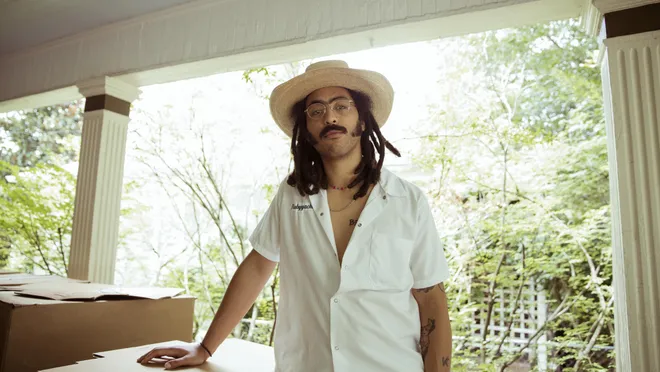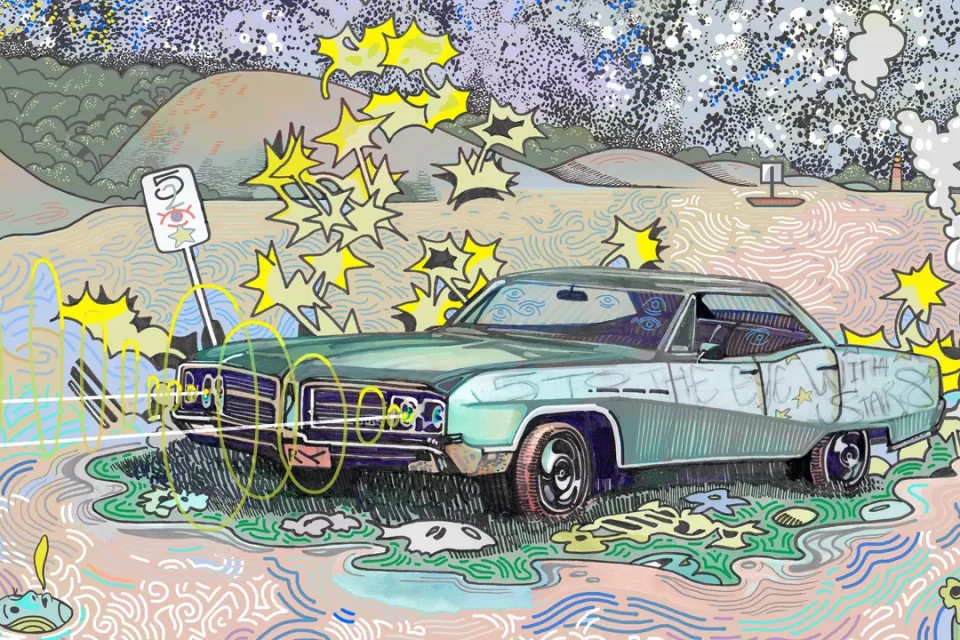
“I’m an orator.” R.A.P Ferreira states plainly. I’d come over to his house in West Nashville on a 50 degree day after work. I’ve personally been interested in R.A.P. Ferreira since I heard about him when we both lived in Milwaukee. I heard that he’d opened a record store on an island off the coast of Maine. That he’s friends with Sam Herring of Future Islands. And I also heard that he was voted Governor of the state of Wisconsin when he went to Badger Boys State camp. A political camp for high school boys that I also attended. All of the rumors are true. The record store is called Soul Folks and there is a second location coming to Nashville. Sam Herring actually texted Ferreira bars as we were interviewing. And he was voted Governor. That’s where the orator comment came from. “At Badger Boys State I was like, ‘Let’s see what I can do here.’ And then I learned. I was voted Governor. I was sixteen and I became in tune to the idea that I didn’t have to do anything but be good at talking. ‘Okay. Proceed.’ I thought.”
Being good at talking is what makes R.A.P. Ferreira, full name, Raury Allan Phillip Ferreira a great rapper. “5 to the Eye with Stars” is a line Ferreira lifted from vocalese master Kurt Elling. Five to the eye is a knockout punch. Something that’s great. It’s not a slang term that is used on the regular, but if you’re cool you get it. That is Ferreira’s entire vibe. Like Elling, you might call Ferreira’s artform vocalese. Bending words into abstraction, using context clues to fill in the details, landing a syllable in an unpredictable way is the through line of Ferreira’s work. “If you get it you get it. If you don’t, well, that’s cool.” Ferreira tells me from across a kitchen table.
If you get it, it’s an ancient artform that has taken on a new light. It’s the kind of epic poetry that keeps the cosmos orbiting. It’s five to the eye with stars.
On the Record: A Q&A With R.A.P. Ferreira
Justin Barney: “5 to the Eye with Stars” is a great title. What’s the idea there?
RAP Ferreira: Do you know who Kurt Elling is?
JB: No.
RF: Kurt Elling is a jazz man, theologian, poet, vocalese master and great thinker of our time.
He has a record called “Live the Green Mill Jazz Club, Chicago/1999,” something like that. It’s one of my favorite albums. I play it all the time. The second to last song on that is called “The Rent Party.” And it’s like this great jazz monologue piece about your girl leaving you and taking all your money and rent’s due and what can you do? So you throw a rent party. Then he uses that to introduce his band. He’s like, “So, so who’s at your party playing?” Then he introduces his cat and that cat. It’s great. It’s amazing. And he describes one of the dudes, it’s the drummer and he says something like, “It’s a knockout punch. It’s five to the eye with stars.”
My mom put me on to that album as a kid. So it’s always been floating around in my brain. Like, it’s five to the eye with stars. It’s top shelf shit. And that’s how I feel about the album. It’s five to the eye with stars.
Justin Barney: Walk us through “Fighting Back.”
RAP Ferreira: “Fighting Back” started because I love family. Lineage. I’m obsessed with lineage. And documenting Black people and Black people ideas, Black culture because it isn’t well done. And when it is done, it isn’t from our perspective.
So I wanted to make a record that had certain beat makers. Daddy Kev was one of them because of work that he’s done that impacted me so much as a child, as a young adult teenager, as a man, as a father. His music has been accompanying me for a long time.
JB: Whois Daddy Kev?
RF: Daddy Kev is a producer, business owner, club night promoter, deejay, bon vivant, visionary, empower, empowermentor. I don’t know somebody who gives people the keys. He puts a battery in your back. I’d listen to his work with a number of rappers Awol One. That song, “Rules of the Week” changed my life.
He produced on all the weirdest rap songs basically. And those are my favorites. So I wanted to get that energy on this album. So I worked up the nerve to ask him and he gave me some beats, and that one I really gravitated to immediately.
For the bit that says, “It’s epic poetry that keeps the cosmos orbiting,” I think I took an anthropology class in college, and it was something like, I can’t remember where in, South America, but there’s group of monks. Every morning these brothers come out and they sing off this cliff. As long as like time has been recorded, they have recorded themselves singing this song off of this cliff. And they say the whole world exists because they do that. And they’re like, “If we don’t wake up and do this, everyone will die.” And that’s how I felt about like me and Kev on the beat. It was like this song is why we’re not dead. We’re the reason everything’s okay.
Justin Barney: You do the song with Hemlock Ernst, which is the rap name of Sam Herring, lead singer of the band Future Islands. What is your relationship?
RAP Ferreira: That’s big, bro. Sam is definitely my big brother in life and music shit.
I was just a fan of Future Islands. Like a big one. In 2013, living my girl, then breaking up, about to move to L.A. and would, like, lay on my bathroom floor crying, just listening to Future Islands. I was, like, really a fan.
Then I moved out to Cali. And one day the Future Island’s account tweeted about Serengeti. My friend and colleague and rapper.
And then I knew that Sam was a rap head. As soon as he tweeted about Geti I was just such a shameless motherfucker. I tweeted like, “Well, if you fuck with Geti, you must fuck with me.” Sam was not alarmed by that, but was like, “Oh, wow, you’re super dope.” And so when I moved out to L.A., we started to kick it and he’s just been a really steadfast, actual friend in my life. There’s so few musicians I’ve met who become my actual friends in real life, and that’s one that really cherish.
He’s a beast, though. I feel like he’s writing like 30 plus bars a day.
Justin Barney: On “Ark Doors” you say that you will challenge someone to a game of horseshoes. I love how you deliver that. Nobody would hit horseshoes like that.
RAP Ferreira: Actually, it’s been done.
JB: Let me eat my words.
RF: Again, lineage is important to me. Arrested Development. [1.0s]
JB: Milwaukee, Wisconsin.
RF: Exactly. They have the song “Tennessee,” where there is a little aside. I don’t know whose voice it is, but she’s like, “Headliner. I challenge you to a game of horseshoes.” Something somthin somthing somthin, “A game of HORSESHOES.” And she says it so ill. And I just like my whole life. That’s a record I’ve played my whole life. Again, I have all these phrases pinging around and I got to the end of that song and I felt just like that, like, “I challenge you to a game of horseshoes.”
JB: Why horseshoes? You know?
RF: And I have always wondered that too. Horseshoes being a symbol of luck in life, I almost take it as being like, let’s see who the universe fucks with more.
To play horseshoes you kind of got to be ill. You got to be coordinated. You got to be of right mind and body to play that. And to challenge someone to that, it’s casual, but it’s also like, “Damn dawg a game of horseshoes?” It’s so specific. It’s like, “I challenge you to something that only I’m gonna win at.” And I like pairing that with the billionaire energy. Of somebody who’s won the game of money. Why am I better at horseshoes than you, billionaire,? You know, some snide shit. Some rap shit.
Justin Barney: Tell me about “Tennessee Farmer Jitsu.”
RAP Ferreira: I started learning the guitar two years ago. Started playing blues. Got really into it and I’m a nerd. I can’t help but combine my worlds. And so my teacher would show me different stuff. We’re always talking about the right hand in guitar. Like, what’s the right hand doing? Like, look at what the right hand is doing and so I just started calling that jitsu. Then it just carried over for me. I wanted, um. I couldn’t make this album without making a blues album first. And that’s like there’s an interplay there that like nobody’s really discussed. But like the Crow Billiken record to me was like a part of “Five to the eye with Stars” and like on “Lampiao’s Flow” when I say, “I was singing the blues, eating greens,” like that’s not a metaphor. I really took the time to learn a hundred hundred year old songs.
My grandfather was a living article of that that time and space. He died at the beginning of COVID. He was raised in Blytheville, Arkansas, which is about three and a half hours west of here. Man, I remember him hamboning. I remember him doing a bunch of different stuff, and I was just like, “Bro, so all that’s gone now?” That was really fucking with me being a dad and just being like, so all that’s gone. My kids aren’t going to hear our people’s music. They’re not going to experience that euphoria that I did of seeing old people love old people music.
And now I’m old people. I just, like, looked in the mirror one day and I was like, Bro, I guess it’s on me.
The blues makes sense to me and it offers me maybe even more mature outlets for some ugly emotions like anger or jealousy or rage. You know, like I don’t necessarily like encoding those things in rap. It doesn’t feel good to me.
JB: Why?
RF: Because rap is overwhelmed by those things. It doesn’t need me to add to it. That’s why I like being a whimsical rapper. Because there’s not enough of that.
It doesn’t feel good to me to make a hateful rap song. But I have a lot of hate in me that I need to learn how to get out. And for whatever reason, I’ll make a blues about kicking your ass.

